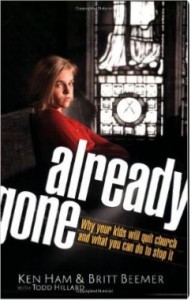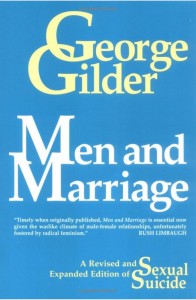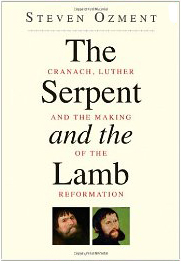Already Gone?

That’s the title of a provocative book published in 2009 by Ken Ham and Britt Beemer. Its thesis is that, contrary to what many had assumed, we’re not losing evangelical kids because their faith is challenged when they go off to college.
We’re losing them in middle school and high school.
Ham & Beemer uncovered this shocking fact by doing some meticulous research – asking a large sample of 20 year olds why they had stopped attending church. They have stopped attending church, you know. The phenomenon has been recognized for years now. Two thirds (2/3) of those who attended church regularly as children stop going to church in their 20s. The question is “Why?”
For years, the widely accepted answer was that they were secularized by the colleges they went to. The real answer is more troubling.
Ham & Beemer probed deeper in their questions about belief and church attendance and, in particular, asked when these 20-year-olds began to doubt that the Bible was true. Confidence in the truth of the Bible is closely correlated with church attendance among 20 year olds. Of those who no longer believe the Bible to be true, roughly 40%, first had doubts when they were in middle school. 44% first had doubts when they were in high school. Only 10.6% report they first began to doubt the Bible when they were in college.
In short, the church has not lost these children because they were secularized in college. They were already gone before they left for college.
Here are the more shocking results of Ham & Beemer’s research: There is a correlation between Sunday School attendance and skepticism about the Bible. Those who had attended Sunday School regularly were MORE likely to doubt that the Bible is true. Here’s the most stunning question: “Do you believe you have become more anti-church through the years?” 39.1% of those who attended Sunday School regularly said yes, they have become more anti-church. Only 26.9% of those who DIDN’T attend Sunday School said yes.
For the 20-year-olds surveyed by Ham & Beemer (a large national sample, demographically balanced), Sunday School had a negative effect on their attitude towards church.
The research is convincing and disturbing. The situation uncovered by Ham and Beemer is serious, with serious implications for the long-term health of the church.
What can be done?
First, let me emphasize that Ham & Beemer are NOT anti-Sunday School. They resist the temptation to bash the whole concept of Sunday School, or suggest that it be abandoned. And although they do point out that there is no specific biblical mandate for Sunday School, they hasten to add that there is no biblical case to be made that it’s a bad idea. In any event they don’t believe that the problem is the institution of Sunday School – it is the content and attitude of how Sunday School is being conducted which is at the root of the problem. The problem is systemic, subtle, and insidious. The systemic problem is the abdication of families in the religious instruction of children. Parents whose faith is unformed or uninformed and whose understanding of the Bible is shallow will not be able to convince their children that the Bible is true and authoritative. If parents have no conviction that the Bible is true, then their children are unlikely to ever believe it either. It won’t matter much whether Sunday School is abolished, or extremely well-taught with excellent materials if parents don’t live a life of faith at home where they are closely watched by their children.
Ham & Beemer’s first challenge is to parents: Defend the Word. Live the Word. Parents if you are unsure about the Bible, it’s time to invest in some adult Christian education for yourself. Our culture has been waging a full-bore attack on the truth and accuracy of the Bible for generations. If you’ve not thought about the issues, it’s quite likely that your own faith has been weakened or undermined by the 24/7 assaults of movies, tv, news & talk shows and popular culture. The secular world dismisses the Bible as a ridiculous collection of myths and fairy tales. What do you believe? Can you answer the world’s attacks? Your children will inevitably ask you. You need to be prepared with an answer. “Be ready always to give an answer of the hope that is in you” (1 Peter 3:15).
Ham & Beemer’s second challenge is to all those involved in Sunday School and Christian Education: Defend the Word. Live the Word. Get trained. Find solid curriculum. If necessary, just sit down and teach the Bible (now there’s a radical concept). My favorite admonition: Teach Bible history, not Bible stories. Far too much Sunday School curriculum treats the Bible as if it were Aesop’s Fables. A cute story is told, followed by a moral principle found in the story. Children instantly understand that it is completely irrelevant whether the story is true or not. If the Bible is told as a fable with a moral, you’re actually communicating that it’s most likely NOT true. DON’T DO THIS. The Bible is not hard. It was designed to be read to children. Cf. Deuteronomy 6:7. The things God calls us to teach to our children are not the morals – he calls us to teach the scriptures.
Ham & Beemer have similar exhortations for youth pastors and pastors. Be sure in your own mind about the truth and authority of the Bible. Then teach it confidently.
Because the message of Ham & Beemer can be easily misunderstood and misapplied, I want to stress that it is not a structural problem that is causing young people to leave the church. There is no magic structure, or magic program, or magic formula that will change the demographics of young people leaving the church. Abolishing Sunday School or simply re-organizing Sunday School will not solve the problem. The problem is not the structure. The problem is and has been the content of what is taught in the home and in Sunday School.
There does not need to be another lost generation. Jesus loves these kids. They need him desperately (as do we all). Our culture needs Jesus. Our best hope to reach the culture is by equipping our kids. The Holy Spirit uses the preaching and teaching of the Word to bring young and old into a relationship with Jesus. When we ignore the Word, or devalue the Word, we undermine and block the very tool by which the Holy Spirit works. The Word is Truth. Jesus is revealed in the Word. We have no higher calling than to preach Jesus and Him crucified. And how shall any know of Him, except through the Word?
There is a crisis in the church. There is a crisis with young people. They are leaving the church because they have no reason to stay. They have only vague notions about Jesus. Sunday School Jesus, sadly, is often little more than Aesop with a pious story. The Word gives us a much richer picture of Jesus than that. We need to teach the Word, defend the Word – that our children may come to know Jesus.
I commend Ham & Beemer’s book to all of those involved in the education of young people. I hope it scares you and makes you think.
(originally published in Family Magazine)
 I am a short term pessimist about the future of western civilization in general, and the United States in particular.
I am a short term pessimist about the future of western civilization in general, and the United States in particular.





![Marriage: Just a Piece of Paper? [VHS]](http://ecx.images-amazon.com/images/I/5193JZRJWML._SL500_AA300_.jpg) My irony meter has been pegged for a long time by the spectacle of the leftist intelligentsia’s hypocrisy on marriage. I’m a boomer. I cut my teeth on the denunciations of marriage as oppressive and outmoded. “Why do we need a piece of paper, man?”
My irony meter has been pegged for a long time by the spectacle of the leftist intelligentsia’s hypocrisy on marriage. I’m a boomer. I cut my teeth on the denunciations of marriage as oppressive and outmoded. “Why do we need a piece of paper, man?”